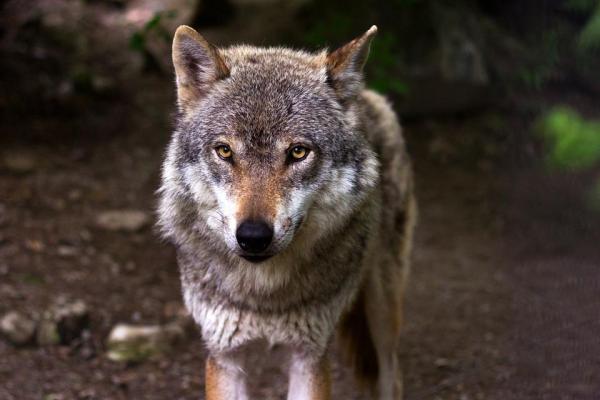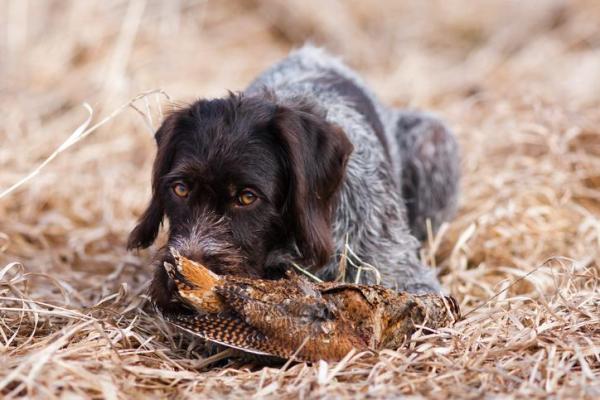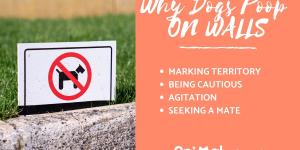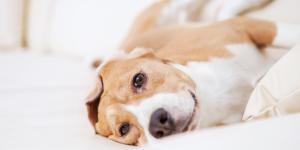Why Do Dogs Roll in on Dead Things?



See files for Dogs
Dogs roll on dead animals and other stinky materials as a part of their territorial behaviors. As with much canine behavior, rolling around in dead animal remains is an activity we may struggle to comprehend. We may think they just enjoy filth, but there are reasons behind this action, some of which reveal a lot about their canine nature. Sometimes the dog may also engage in eating the dead animal or eating poop of other animals. In these cases, some context is needed so that we can understand the psychology of the dog. It is not always a sign of a major health problem, but we need to consider a possible physiological cause.
If you see this behavior, AnimalWised asks why do dogs roll around on dead things? We also provide some information on how you might be able to prevent this behavior from happening if you are concerned about hygiene or other issues.
Is it normal for a dog to roll on dead things?
The first thing we need to learn is that rolling in dead animals is often a completely normal behavior, no matter how stinky or gross it appears to us. As with all dog behaviors, this will depend on the context. Our dogs will often do many things which are completely normal, even if they don't seem to be the most hygienic.
Rolling on dead things is not usually a symptom of a physical or behavioral problem. Known as scent rolling, it is an instinctual behavior which helps a dog to feel more secure in their environment. On rare occasions, it may be a sign of a physical or emotional health issue. To help determine if this is the case, we need to look at the context of the behavior and whether they are exhibiting any other symptoms which may indicate a problem.
We start by looking at how domestic dog behavior is related to their wild counterparts. By looking at the behaviors of wolves and other canids, we might be better able to understand our own dog's behaviors such as when rolling in dead things.
Communicating with other dogs
In wolves, scent rolling on dead animals is used to transmit information to the rest of the pack. Carrion is food which is derived from the carcasses of deceased animals, as opposed to fresh meat. When a wolf encounters a dead animal carcass, they can rub the scent over their body, face and neck by rolling in the dead animal remains.
When this wolf returns to the rest of the pack, the other members smell the new scent and can then use it to follow the trail to its origin. Wolves and wild dogs will rely more on scavenging in this way during times of scarcity. If there is less prey in their environment, the risks which come with eating carrion are often worth the possible dietary reward.
Some experts claim this behavior is typical of many canids, being passed down onto domestic dogs as a residual behavior from their wild heritage. However, this does not necessarily explain why dogs roll other stinky stuff such as poop. It may be related to this behavior in some way, perhaps as a way to simply alert the presence of these animals in their vicinity.
Learn more about the dog's canid cousin with our article on whether wolves attack humans.

Marking behavior
Some dog guardians make the suggestion that dogs will rub themselves in an animal's remains due to territorial behaviors. They claim the dogs are marking the remains with their body. Dogs produce scents on their paw pads as well as on the part behind their ears. If you see a dog scratching at the ground, they are often doing this to mark their territory. If a dog wallows on the ground and rubbing their head or body against dead things, they may be doing it for the same reason.
The true nature of canine pheromones and how dogs use scent marking is relatively unknown to ethology. A dog may rub themselves on animal remains to communicate to other dogs that the carcass belongs to them. This would provide the answer when people ask why does their dog rub themselves on disgusting things?
If a dog rubs themselves in feces, we might expect a similar answer. However, the strongest marking scents will come from their own urine or feces. If this is an option for the dog, it might not make as much sense to rub their body in something which would mark them with another animal's scent.
Learn more about how dogs use scent to communicate with our article asking why do dogs lick the urine of other dogs?
Cover their scent
Another explanation why a dog might roll around in the remains of dead animals is so they may cover their tracks. This also is a potential inheritance from their wild ancestors. A wild dog's prey also has a well developed sense of smell and can detect a predator if they catch it on a prevailing wind. It is possible a dog may roll in animal remains or a similar strong scent to hide their own smell from this prey. There is some evidence that modern wolves do the same[1].
Some also say that if we bathe our dog, we can lost their natural scent through the use of perfumed shampoos and other bathing products. They may roll round on the ground to get a more ‘natural’ smell. However, rolling in garbage, dead things or something similar doesn't necessarily mean they will smell like themselves. Also, while you may wash off some when bathing, getting rid of all of a dog's natural smell would be very unlikely.

Cry for attention
When dogs are emotionally unwell or suffering from a hidden ailment, they make seek out their guardian's attention. As dogs get a sense of well-being from positive interactions with humans, this is understandable. If the dog is stressed, lonely or suffering from a lack of stimulation, they may engage in the practice of wallowing in feces or similar to get the attention they crave.
If the dog continues to exhibit this behavior, it is quite possible it has been accidentally reinforced by the owner. If this occurs, the human needs to find ways to prevent this from happening.
Discover the signs a dog is stressed in our related guide.
How to prevent dogs from scent rolling in dead things
First we need to understand that it is most likely part of a healthy and natural behavior. A dog will roll around on the ground for a variety of reasons, most often just to play and expend some energy. It might be possible the dog is wallowing in something like feces or dead animal remains, but doesn't intend to. It is not the same as eating feces which can be the sign of something wrong, a topic explored in our article on why dogs eat poop.
You should only really be concerned if the dog is exhibiting this behavior due to stress. If this is the case, you will need to address these stressors and prevent the behavior in this way.
If you think the dog might be going towards something you don't want them to roll around in, then you can use (or refresh) their basic obedience training. These can involve basic commands like ‘heed’ or ‘sit’. Training the dog properly involves the use of positive reinforcement and can be used as a control mechanism for unhygienic behavior.
Once you have successfully prevented the dog from rolling in animal remains, you need to remove them from the area and give them a reward for their good behavior. We can also help them to ignore these animal corpses through games and generally providing adequate physical and mental stimulation.

Why does a dog eat dead things or feces?
If your dog regularly eats their own feces of that of other animals, you will need to take them to the veterinarian. There are various reasons for a dog eating feces, but one of them is that they have an enzyme deficit. This can be an inability to digest certain foods or it may be a symptom of nutritional deficiencies. An exocrine pancreatic insufficiency can also cause malabsorption in the dog.
This is why it is so important to look at the other symptoms when a dog eats excrement. Malabsorption will usually result in weight loss, diarrhea and the dog will desperately try to eat anything to get the nutrients it is missing.
If you have other animals at home such as cats, rabbits or rodents, dogs may eat their feces due to the presence of vitamins in the stool. In particular, rabbits and rodents have excrement which is rich in vitamin B.
Another reason a dog east dead animals or feces may be that the dog has intestinal parasites such as worms. Intestinal parasites absorb the nutrients your dog usually gets from their food. In the wild, stool can act as a natural dewormer. If you provide a suitable diet for your dog and yet they are still searching out other food in the form of dead animals or feces, then you need to take them to the vet to rule out dietary issues or parasites.
Learn more about this rolling in stinky substances behavior with our video below:

If you want to read similar articles to Why Do Dogs Roll in on Dead Things?, we recommend you visit our Behavioral problems category.
1. Boić, N., Jukić, N., Mikuška, A., Bjedov, D., Kovačić, M., Šalika-Todorović, T., & Sudarić Bogojević, M. (2024). Preliminary Study of Scent Rolling in Captive Wolves (Canis lupus L. 1758) in Response to Olfactory Enrichment. Biology, 13(6), 422.
https://doi.org/10.3390/biology13060422








